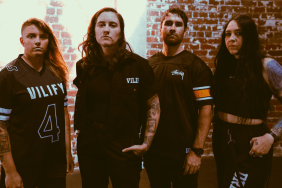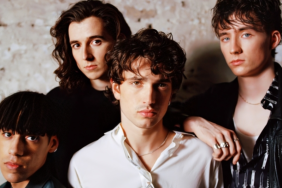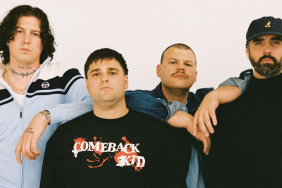Tim Rogers is a statesman of Australian music. A gruff looking poet who somehow treads between cheeky rebellious youth and imposing father figure; Rogers has a reputation for giving it to you straight while also remaining unguarded and self-effacing.
Currently on the road behind his soon-to-be released new solo record Rogers Sings Rogerstein, Music Feeds got on the phone with Rogers just before the tour began to talk about the new album. In the process Rogers candidly and graciously gave his opinions on country music and life on and off the road, and he revealed a love for ‘modern dance music’.
Writer’s Note: Unfortunately the phone connection on rare occasion did drop out. Where the word was inaudible, ellipsis points are placed to indicate a word or words are missing.
Music Feeds: Now to get started Tim; your last solo effort was more of a stripped-back version of rock similar to that of You Am I, whereas this time (on Rogers Sings Rogerstein) you’ve really delved into country music; is this a genre of music you’ve long wanted to try your hand at making a record of?
Tim Rogers: I don’t hear it being country at all actually, not at all. I’ve listened to a lot of country music, but I think it’s unfortunate (and) it’s a bit lazy to hear acoustic instrumentation to regard it as country, and I just don’t hear it (as country) at all.
You know, there’s some rhythms that are comparable, but I think if you’ve got a love of country music, someone like me, thinking that’s the kind of music I’d make I’d take that as being quite insulting; I mean on their behalf.
There are other bands that I play in that are taking … music and themes and instrumentation that could more closely, you know could be compared to country for sure, but, no, not this record.
MF: Perhaps it’s my misunderstanding, but I’ve always kind of associated country with a stripped-back bluesy type of folk that really is centrered on storytelling. In what way is this a departure from country music for you?
TR: Well, I guess it’s probably my reaction to you saying that is what passes as country music. I too see country music as in its essence being great storytelling, and too often, particularly in the past couple of decades, when … of a rock band gets coming down from cocaine psychoses … buying an expensive acoustic guitar and write a bunch of clichés and something about lost love in a G chord.
I guess maybe, to draw a long bow, maybe what I’m trying to write when I make these records is akin to – well, it’s searching for something maybe a little essential or odd. Maybe you’re right and I’m wrong. When listening to very old country music and folk music, old Irish balladry and Scottish ballads, they’re fucking old songs. They’re about boot-makers and murders and obsessive love and drug addiction and good drugs, you know [laughter].
So I guess that maybe you’re right. Because I’ve just finished a project like a theatre project and now I’m sort of starting to get thinking about touring again – I mean, I never stopped touring really, but you know, touring with a little band – and I start to become aware of what’s going on (with) friends and contemporaries and enemies and the music that they make, and maybe I’m just too full of all of that [laughter]. I woke up this morning and thought ‘Oh fuck, that’s right! Back in the contemporary music world’. And maybe I’m just a little shocked and intimidated and underwhelmed by what I’m hearing.
MF: Underwhelmed from what you’re hearing as in the reaction from contemporary music media in general?
TR: I don’t care about media; no, I mean other songwriters, and intimidated as well. I mean, I hear wonderful stuff everyday and terrible stuff, the whole mix. There’s just so much music out there and I don’t wonder why I go and hide and try to research music that I don’t play. You know, whether it’s cello sweeps or tango music or older Mexican forms or maybe coz it’s just listening to what my friends are doing, it’s too good or too bad [laugher] and I just know how to tell someone about it.
MF: Now to go back to what you said just a moment ago Tim, you have just recently finished up a theatre production. I was wondering did that process increase your desire for the storytelling that is throughout this record?
TR: It’s called Tepid actually. I mean, when working with theatre or with films, you’re trying to serve script and actors and the director as well as your own battered whore of a muse. And with these records and what I do with the band, it’s pretty much just my own felicitous imagination, you know, and I see a pretty big distinction.
I mean, I get the influence in that just because of the other musicians that I work with. Like, for example, just this morning actually for the sound design I was working on for the theatre. Just his ideas and … I can’t see a direct correlation to how that will influence this record, coz I made it quite a while ago, or the next You Am I, but it’ll get in there somehow.
“Like ink into this chalk,” as Professor Julius Sumner Miller will (say), it gets in there somehow. I’m thinking that, that happens because I’m finding daily life increasingly difficult and so my brain must be – it’s clogged full of information [laughter] from working with these people and the actors and the directors. It gets in there somehow but quite whether … delineate that into each project it can be increasingly difficult.
MF: How do you mean you’re finding day-to-day life increasingly difficult?
TR: Well, when you kind of devote all your time, through necessity and through desire, into work, regular things like sort of managing to pay bills and how to make a sandwich become increasingly difficult.
I don’t know whether maybe that’s just through dementia [laughter]. I mean it’s all in how, you know. I was just in the US last month and to get around from gig to gig and where I was staying, you know, all that’s easy and possibly for someone else that’s difficult. And then just doing (things) like remembering to pick up, you know. I just got home and I’m home for a couple of weeks – you know, my bedroom’s just this, it’s like my seventeen-year-old bedroom – ‘Come on man, I’m 42 what about this is so difficult?’ [laughter] And remembering to communicate with people, remembering to make doctors appointments and things.
You know, part of me feels, I feel guilty about that coz’ I think, ‘Fuck, I’m living some sort of bohemian dream’ and then I think ‘Well, am I just copping out?’, you know. I’ll figure it out by lunchtime.
MF: It’s interesting you feel that way though coz I imagine a lot of people from outside the life of a musician would look at your life, your unconventional life, with envy. It almost seems as though you envy the ability of people who go through the conventional nine-to-five, their capacity to just do day-to-day chores, mundane chores.
TR: Well, I think, I think just to be reasonable to people it’s less the chores, really you know I can get by. I mean when I was back to my day job this year, you know, all that stuff was great. I could pay rent and it was all good and I’d just turn up to work on time, do my eight hours then go to the pub, and it was great. You know, it was all fine.
Like I said, I’ll try to figure it out by lunchtime; I’m not planning on being confused most of the day. It’s just in-between projects I’ve got two or three days off and other people, I don’t know, maybe they’d go on a bender. Well, I did and then I kind of work up in this panic like, ‘Fuck, right, I gotta’ get onto the next thing’. There’s no time to take breaks and go on holidays and shit like that, you know.
MF: The difficulties of dealing with day-to-day routine chores – is that kind of where part of Part Time Dads (on Rogers Sings Rogerstein) comes from?
TR: No, I mean when in matters to do with my daughter, I don’t – I mean that song’s not exclusively written about me, first off. And I really did debate whether or not to put that on the record or release it at all.
No, I mean important things like your relationship with children, that’s when everything crystalizes. I just think it’s a lack of responsibility towards yourself. You know, I live alone, I live a very solitary kind of life and unfortunately I think that means you spend a lot of time thinking about yourself. No, when I’m with her, when I can be with her, that stuff’s easy coz you know, you just want to protect and enjoy and show love; that’s kind of easy.
Part Time Dads, I don’t know, I mean there’s that kind of coda at the end that says, ‘Hey, look it’s just one of those days’. This isn’t a damning portrayal of the single dad of anything at all, no it’s not. I mean, I was pretty careful to make sure that wasn’t a whinge, coz you know, I’ve made my bed and I’ve got to lie in it; do the crime do the time all that kind of stuff.
So, I kind of make these records and not expect anyone to hear them, but then why would I release them? Obviously my ego is that rampant that I think that somebody might what to hear them, so I put them out. Then after I put them out, later I’m ‘Oh fuck! [laughter] Why didn’t I just write another twelve songs about being in love with rock and roll or write songs about nothing.’
MF: You said just before that you might have not even put that song (Part Time Dads) on the record. I recall a few years ago when you were talking to Andrew Denton you said you always struggle with that balance of putting your family and your friends into songs. Was that the reason why you were a bit iffy about putting it on the record, exposing your personal relationship with your daughter?
TR: Well, it’s not exclusively about my relationship with my daughter, but it could be construed about that. And as she grows I didn’t ever want that to be confused coz’ you know, I love her so much I don’t want anything to – but you know, you’ve got to re-approach your relationship with people all the time.
Look, I struggled with it (for) a while coz’ I didn’t want to use them, but then you’ve got to think, ‘What am I concerned about?’ And apart from some larger concerns, what I … about love and think about most of the time are people close to me. So why wouldn’t I write songs that somehow their versions of themselves are included. I just don’t want it to always be so reactive, so quick you know, ‘Hey, something collapses in your relationship with somebody – friend or a lover – and quick let’s write a song about it’.
I just want to avoid doing that, that’s … a bit lazy but, you know, I’m sort of consumed by passions and frustrations and, you know, in other writing I’ll write about larger concerns. With songs, if you’re writing from the heart and from your groin, a lot of that stuff can get into it for better or worse, you know.
I figure at least I’m being honest. I mean there’s worse ways to be.
MF: You’ve said in the past with your rock music it’s a bit more about larger things. Were you really conscious of making this record a very personal statement about very specific stories?
TR: No, no, no I don’t want them to be personal, that’s the thing, that’s my failing. If I was a better writer they wouldn’t be personal. I think it’s like an admission of failure almost a lot of it (to) myself and an admission of failure that I can’t – I’d much rather write about other people, other situations, other characters, made-up characters, and to have myself in there I fear is a failing on my part.
You know, coz at times I’ve gotta admit I see my life as quite interesting, but that happens about half an hour a day and the rest of the time I’m just fascinated by the way other people get through and what they do. And the way I can be more interesting and a better serving kind of person is to serve other people and I don’t know whether writing about myself in this way serves anybody.
I’m yet to find out. I mean if it does, then great, I’ll be happy, but I just get so much enjoyment from making the music and get so overwhelmed by it and then when listening back to it, it’s like, ‘Ah damn, it’s about me again or someone approximating me or someone that looks a lot like me but has, you know, better skin’.
MF: You’re kind of berating yourself for being narcissistic, but then most music fans are also narcissistic and they take the tale and put themselves in the centre of it and it kind of acts as a catharsis for them. Does that give you any satisfaction at all?
TR: Well now that you say that, yeah [laughter]. Thank you, I appreciate that. Actually, that’s a lovely thought, I’ll consider that when I put on my hair shirt later in the day.
MF: I better ask you Tim because they’re gonna give me the wrap up soon and there were two songs (on Rogers Sings Rogerstein) I was really interested in talking to you about I thought they kind of worked together, although they’re not in succession on the record: Beefy Jock Guys and Modern Dance Music and Walking Past the Bars.
I thought they worked together in the sense that, you know, so much of modern dance music, it’s so much of a club scene now and there does seem to be a disconnectedness from the romantic tales of pub lore. What inspired you to write those songs and do you think that Australian music has forgotten its tradition of Australian pub bands?
TR: Well, I don’t really care about that to tell you the truth; I’m not here to keep any tradition alive. I mean, I love a lot of modern dance music, you know, I love going out dancing and Beefy Jock Guys and Modern Dance Music , most of it was – you know, I was riding my bike past the festival on New Year’s Day and all the guys with the glow sticks going to the festival looked like kind of jocks of yesteryear, and there’s not a lot of seriousness behind that and I find that song really is just fun.
And it’s me taking on the character; it fully is the guy you’re suggesting: the crotchety old, ‘Why aren’t things the way I remember them’, which is not the way I am at all. I mean, if we hung out for a couple of days and you kind of listened to what I would listen to just for fun, I’m always looking for things to turn me on, to dance to, get into fights to, to ride my bike to, and so that’s probably more taking on a character.
And then I guess the comparison with Walking Past the Bars is – I had some health problems a couple of years ago and (I was) just in the company of an old couple who had to stare in the face of, you know, the way they had been living. They had to stop it or they were going to die and they had to make that choice, ‘Well we’re either going to die together really soon or live a different way and a little bit longer’. And trying to deal with that torpor and that boredom of having to stop the way you live your life, you know. But I guess they’re both character songs, that’s the only way I can see them as being in comparison.
Beefy Jock Guys is absolutely supposed to be tickling my sense of humour … and I think probably Megan (Washington) can back this up. When I first started writing it and Megan and I were writing some songs together, it was absolutely a high-energy dance track.
MF: Yeah?
TR: Yeah, yeah coz I was loving dance music at the time and still do, but whether it will ever come out I don’t know, or whether I’ll ever come out who knows [laughter]. That’s my crotchety sense of humour and Walking Past the Bars, I don’t hear as vague at all, you know, I’m still in contact with those people, they’re still alive.
MF: I find it hard to imagine a Tim Rogers remix where you put out a dance version of that song (Beefy Jock Guys and Modern Dance Music)
TR: I’d love to; it’s an absolute, absolute dream. I really wanted to get a couple of songs of the last You Am I record redone; the first thing was Shuck and a couple of others, and wanted to get something absolutely … because I’ll hear some really good remixing going on and I guess it’s never really been done with myself or my band.
Paul Mac and I talked about it a little bit a couple of years ago. I see him about once a year, he’s a guy I just really trust and love his company, and whenever I kind of suggest it to him he laughs with this, you know, he thinks I’m taking the piss when really I’m being serious. When really you know, I was born to dance baby [laughter].
Rogers Sings Rogerstein by Tim Rogers out August 24, 2012. Available digitally and via ABC label Four | Four.
Tim Rogers – Rogers Sings Rogerstein – Tour Dates
*Catherine Britt appearing
TICKETS ON SALE NOW
August
23 Thursday – Old Museum, Brisbane*
Old Museum Box Office and http://www.oztix.com.au
24 Friday – Great Northern, Byron Bay*
Tickets: http://www.thenorthern.oztix.com.au & http://www.oztix.com.au
25 Saturday – Spotted Cow, Toowoomba*
Tickets: http://www.oztix.com.au/
30 Thursday – Milton Theatre, Milton, NSW*
Country Leather Milton 0244553056 & Malibu Music Ulladulla 02 44555693
31 Friday – The Factory Theatre, Marrickville, NSW*
Tickets: http://www.factorytheatre.com.au & http://www.ticketek.com.au
September
1 Saturday – The Abbey, Canberra*
Thru the venue 0262302905 & http://www.theabbey.com.au
5 Wednesday – Railway Club, Darwin*
At the venue 0889814171 – http://www.darwinrailwayclub.com
6 Thursday – Railway Club, Darwin*
At the venue 0889814171 – http://www.darwinrailwayclub.com
13 Thursday – Spirit Bar & Lounge, Traralgon
Tickets: http://www.oztix.com.au/
14 Friday- Regal Theatre Ballroom Northcote*
Tickets: http://www.oztix.com.au/
20 Thursday – The Governor Hindmarsh, Adelaide*
Tickets: http://www.thegov.com.au & http://www.venuetix.com.au & http://www.moshtix.com.au
27 Thursday – Clancy’s Dunsborough, WA
Tickets: http://www.heatseeker.com.au, Mills, 78s, Planet, Star
28 Friday – Fly By Night, Fremantle, WA
Tickets: http://www.heatseeker.com.au http://www.flybynight.org, Mills, Planet, 78’s
29 Saturday – Rosemount Hotel, Perth
Tickets: http://www.heatseeker.com.au, Mills, 78s, Planet, Star
30 Sunday Wave Rock, Weekender, Hyden WA
Tickets: http://www.soulhighway.com.au/
October
5 Friday – Bended Elbow, Geelong
Tickets: http://www.oztix.com.au
6 Saturday – Theatre Royal, Castlemaine, VIC
Tickets: http://www.theatreroyal.info & at the venue 0354721196












